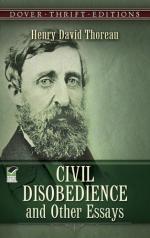
|
| Name: _________________________ | Period: ___________________ |
This test consists of 15 multiple choice questions and 5 short answer questions.
Multiple Choice Questions
1. What did Thoreau ask permission to do at the beginning of 'Walking'?
(a) Elaborate.
(b) Be brief.
(c) Persuade the reader.
(d) Live his life.
2. What about Brown did Thoreau think was misunderstood at the time?
(a) His leadership.
(b) His methods.
(c) His reasonings.
(d) His intentions.
3. What kind of U.S. territories was Brown most interested in serving in?
(a) Free states.
(b) Slave states.
(c) Original colonies.
(d) New territories.
4. What did Thoreau say about most people's idea of improvement?
(a) It was destroying nature.
(b) It was counter-productive.
(c) It was well-founded.
(d) It could never be accomplished.
5. How did Thoreau describe his thesis in 'Walking'?
(a) Natural.
(b) Beautiful.
(c) Radical.
(d) Logical.
6. What did Thoreau say his walking was a metaphor of?
(a) His writing.
(b) His life.
(c) His power.
(d) His thinking.
7. What did Thoreau say Massachusetts was supporting in 'A Plea for Captain John Brown'?
(a) Tyranny.
(b) Slavery.
(c) Adultery.
(d) Perjury.
8. What did Thoreau say people did wrong when writing the word nature?
(a) It should be italicized.
(b) It should be in quotes.
(c) It should be capitalized.
(d) It should be underlined.
9. What was illegal in Massachusetts?
(a) Slavery.
(b) Objecting the popular opinion.
(c) Returning slaves to their rightful owners.
(d) Printing without permission.
10. In 'A Plea for Captain John Brown', who did Thoreau say the newspapers were serving?
(a) Themselves.
(b) The rich citizens.
(c) The government.
(d) The people.
11. What direction did Thoreau say most men tended to walk in when given the chance?
(a) South.
(b) East.
(c) North.
(d) West.
12. Why did Thoreau think most people had the wrong idea about Brown?
(a) They were afraid of him.
(b) They envied him.
(c) They had never met him.
(d) They did not understand him.
13. Who did Thoreau say the newspapers of the time were NOT serving?
(a) The citizens.
(b) Their benefactors.
(c) Themselves.
(d) The governments.
14. What did Thoreau say confused most people about Brown?
(a) His cruelty.
(b) His boldness.
(c) His courage.
(d) His power.
15. What did Thoreau compare what Nature revealed to man to?
(a) Wind.
(b) Rain.
(c) Growth.
(d) Sunshine.
Short Answer Questions
1. What state did Brown work hard to push his agenda before his attacks?
2. Who did Thoreau invite to be a citizen with him?
3. What kind of walls did Thoreau say men should break down?
4. What did Thoreau say he was grateful to not have to worry about while walking?
5. Why did Thoreau say most men would never do what Brown did?
|
This section contains 417 words (approx. 2 pages at 300 words per page) |

|




